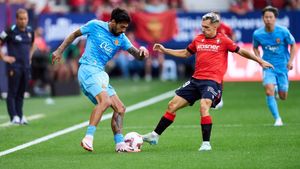The Boston Red Sox have one of the most revered farm systems in baseball, with rankings by various publications attributing this prestige to the "Big Three" of Roman Anthony, Kristian Campbell, and Marcelo Mayer. These three promising prospects could graduate from their minor league status as early as this season, raising questions about the sustainability of Boston's farm system without them. What happens when these top talents take the big stage, and who will step up to support the Red Sox's reputation?
Anthony and Campbell are widely regarded as two of the top-five prospects across all of Major League Baseball, with Mayer closely following behind. Even as the spotlight focuses on these elite players, the Red Sox's minor league ranks still boast talent worth mentioning. Among these names is Franklin Arias, who had already established himself as a right-handed hitting shortstop to watch after impressing during his Low-A debut at Salem.
The organization did face setbacks when they traded two top-100 prospects, Kyle Teel and Braden Montgomery, for the acquisition of pitcher Garrett Crochet from the Chicago White Sox. Although this move was bold, it did raise concerns about the depth of the farm system. Nevertheless, the leadership of the Red Sox has shown adeptness at managing risk through strategic player development.
While some rankings post-Crochet trade have seen the Red Sox drop—in fact, Bleacher Report placed them 13th—experts continue to note the staggering quality within the system. The organization's ability to sustain excellence through nurturing high-quality prospects is becoming their hallmark and speaks volumes about their commitment to securing the future beyond immediate gains.
The imminent graduation of Anthony, Campbell, and Mayer from the minors is poised to provide significant returns. This trio brings not only talent but also hope to the Red Sox's fan base, which has been awaiting the next generation's arrival eagerly. The team's track record of maintaining elite status, even with the potential exit of key figures, signals their dedication to building for the long haul.
Beyond the "Big Three," other names merit attention. The likes of Luis Perales is still recovering from Tommy John surgery but has been touted as one of baseball's best pitching prospects. Meanwhile, Miguel Bleis, who previously made it to the top 100, is still fighting his way back up the rankings. He has showcased flashes of elite speed, power, and defensive capabilities, making him one to watch.
On the horizon, Yoeilin Cespedes—who was once viewed as more valuable than Arias—struggled with injuries after being promoted to Low-A, yet whispers of promise still linger. Jhostynxon Garcia is making waves with his impressive performance at Double-A, combining solid defensive skills with power at the plate.
We cannot ignore the development of Johanfran Garcia, whose early season stats reflected dominance before getting sidelined by injury, as well as Mikey Romero, who, after showcasing unexpected power, looks to inch his way closer to the majors. The diversity of talent on display throughout the Red Sox farm system reminds observers of the depth available.
Although the graduation of Anthony, Campbell, and Mayer will undoubtedly cause the Red Sox to take a hit in rankings, the overall system remains resilient. With budding prospects like the Garcias, Romero, and others showcasing their skills, the future appears bright for Boston's farm system.
It's this blend of proven talent and exciting raw potential, along with proficient management, shining through the strategy employed by the Red Sox, which keeps fans optimistic. The organization clearly understands the value of solidifying their minor league standings even as they prepare for the arrival of their highly-rated prospects. Watch for this strategic masterpiece as it continues to develop, ensuring the Red Sox remain competitive within the league.



